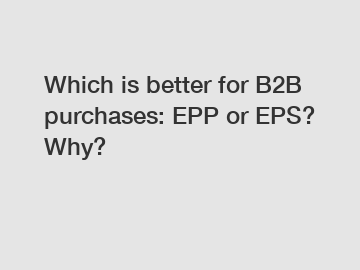Which is better for B2B purchases: EPP or EPS? Why?
In today's fast-paced business environment, making the right purchasing decisions can significantly impact the success and growth of any organization. When it comes to B2B (Business-to-Business) purchases, companies have a plethora of options available to them. Two popular procurement methods often used by businesses are EPP (Enterprise Procurement Platforms) and EPS (Electronic Procurement Systems). In this blog, we will delve into the debate of which is better for B2B purchases and explore the reasons why.
EPPs are comprehensive procurement platforms that offer end-to-end solutions to businesses. These platforms typically provide a centralized hub where companies can manage vendor relationships, negotiate contracts, and streamline the procurement process. On the other hand, EPS refers to the use of electronic systems, such as online marketplaces, to facilitate B2B transactions.
To determine which method is better for B2B purchases, it is crucial to consider several factors. Both EPP and EPS have their unique advantages, so let's analyze them one by one.

1. Efficiency and Cost-Effectiveness:
When it comes to efficiency, EPPs shine. These platforms provide businesses with a simplified and streamlined procurement process. By automating manual tasks, such as purchase requisitions and approvals, EPPs enable organizations to save time and effort. This increased efficiency often translates to significant cost savings in the long run. Moreover, EPPs allow companies to leverage their purchasing power through consolidated contracts and negotiate better prices with suppliers.
EPS, on the other hand, may not offer the same level of efficiency. While online marketplaces provide a wide range of suppliers and products, the procurement process may require manual handling of multiple transactions. This can be time-consuming and may not offer the same cost-saving opportunities as EPPs.
2. Integration and Scalability:
Integration is a crucial factor to consider when choosing a B2B procurement method. EPPs often offer seamless integration with existing ERP (Enterprise Resource Planning) systems, allowing for better data sharing and synchronization. These platforms can also be easily scaled up or down depending on the business's needs.
In contrast, EPS may lack the integration capabilities that EPPs provide. Online marketplaces may have limited compatibility with existing systems, resulting in data silos and inefficiencies. Scaling up an EPS might be challenging due to the need for manual management of transactions.
3. Supplier Relationship Management:
Effective supplier relationship management is essential for sustainable business growth. EPPs excel in this aspect by providing businesses with a centralized platform to manage vendor relationships. This allows for better communication, collaboration, and tracking of supplier performance. EPPs also enable businesses to leverage supplier data and insights, facilitating informed decision-making.
In comparison, EPS may not offer the same level of supplier relationship management. While online marketplaces may provide access to a vast network of suppliers, businesses may face challenges in building and maintaining strong relationships. Communication and visibility can become complex when dealing with multiple suppliers on different platforms.
4. Security and Compliance:
In today's digital landscape, security and compliance are paramount. EPPs provide businesses with robust security features, ensuring sensitive information and transactions are protected. These platforms often adhere to strict compliance regulations, reducing the risk of data breaches and fraud.
On the other hand, EPS may carry higher security risks. While online marketplaces take measures to secure their platforms, the decentralized nature of EPS could expose businesses to vulnerabilities, such as unauthorized access or data leaks. Companies need to carefully evaluate the security features and compliance standards of each EPS they consider.
In conclusion, while both EPPs and EPS have their strengths and weaknesses, EPPs emerge as the preferred choice for B2B purchases. With their emphasis on efficiency, integration, supplier relationship management, and security, EPPs offer businesses comprehensive solutions to optimize their procurement processes. However, every organization's needs are unique, so it is essential to evaluate and compare different platforms to determine which best aligns with your specific business requirements.
Ultimately, the decision of whether to choose an EPP or an EPS depends on factors such as budget, company size, industry, and long-term growth strategy. Collaborating with technology and procurement experts can further guide businesses in making informed decisions that drive success and stay ahead in the dynamic B2B marketplace.
Want more information on Lost foam casting equipment, What is the difference between lost foam casting and solid casting, Lost Foam Casting Services? Feel free to contact us.
65
0
0

Comments
All Comments (0)